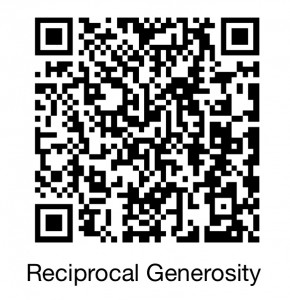I remember a time when as a pastor, my wife and I faced a very serious crisis. We were both discouraged. But unknown to us, a couple in the church had planned a surprise dinner for us in one of the finest restaurants in Dallas. When we walked in, we were escorted to a large banquet room where nearly 100 guests stood and greeted us with a rousing applause. And, to add to the surprise, they had invited our children—two who came home from college. Needless to say, this was a wonderful experience! It lifted our spirits, strengthened our faith and helped restore confidence in ourselves as well as in people.
one of the finest restaurants in Dallas. When we walked in, we were escorted to a large banquet room where nearly 100 guests stood and greeted us with a rousing applause. And, to add to the surprise, they had invited our children—two who came home from college. Needless to say, this was a wonderful experience! It lifted our spirits, strengthened our faith and helped restore confidence in ourselves as well as in people.
Recently I texted my friends and thanked them again for that event and what it continues to mean to my whole family—even though it happened years ago. In addition, I thanked them for their faithful generosity to our ministry over the years. To quote myself, I said—“I will always appreciate and be thankful for what the two of you have done in supporting our ministry over the years and we’ll never forget that special event as long as we live.”
BIBLICAL RESPONSIBILITY
When Paul wrote to the Galatian churches, he addressed this issue very specifically. There is no question about his meaning:
The one who is taught the message must share all his good things with the teacher
(Galatians 6:6).
The message, of course, is the “Word of God,” and the “good things” refers to material possessions. In primitive cultures it may be “chickens and eggs” or “potatoes and corn.” But in most of the New Testament world—and in our culture today—it involves currency. And, in this case, Paul was simply saying to the believers in the Galatian churches—take care of those who spend a lot of time teaching you God’s will from the Scriptures.
Paul elaborated on the theme of “reciprocal generosity” in his first letter to Timothy:
The elders who are good leaders should be considered worthy of an ample honorarium, especially those who work hard at preaching and teaching (1 Timothy 5:17).
A BIBLICAL EXAMPLE
I love the example Luke has given us in the book of Acts. A prophet from Jerusalem came to Antioch in Syria. He prophesied that a great famine was going to impact the whole Roman world and that the Jewish believers in Jerusalem and Judea would suffer in a particular way. Consequently, knowing that this was going to happen—and it did—“each of the disciples, according to his ability, determined to send relief to the brothers who lived in Judea” (Acts 11:29).
What was their motive? They were generously reciprocating because as Gentiles they first heard the good news of Christ’s death and resurrection primarily from Jewish believers who lived in the Judean area but who had come to Antioch to preach the Gospel.
Paul underscored this principle when he wrote his letter to the Christians in Rome. He was raising money to help Jewish believers who were still unable to meet their physical needs because of hard times. Thus he wrote—
For if the Gentiles have shared in their spiritual benefits, then they are obligated to minister to Jews in material needs (Romans 15:27b).
POINTS OF APPLICATION
So what does this mean to those of us who are in our senior years particularly? Here are several points of application.
• First, let’s continue to support our local churches and spiritual leaders who have taught us and built us up in our Christian faith. Yes, our resources may be more limited, but remember, it’s not the amount we give but our motive—a spirit of thankfulness and appreciation.
• Second, let’s give of our “time” and “talents” which are just as important as our “treasures.” In my own ministry today some of my greatest encouragers are volunteers. Don’t let your years of experience and love for Christ lay dormant. These can be some of your most productive opportunities in demonstrating “reciprocal generosity.”
• Third, let’s reciprocate by sharing “words” of thanksgiving and appreciation to those who have ministered to us over the years. This can be just as meaningful—even more so—then material support.
Editors Note: to access a video lesson on “Reciprocal Generosity,” by Dr. Gene A. Getz, use the QR reader on your SmartPhone to connect to this QR code. You can also find this principle and QR code on page 1501 in the new Life Essentials Study Bible authored by Gene Getz and published by Broadman and Holman. This article was originally published in Mature Living Magazine.


2 Comments on “Reciprocal Generosity”
As always Dr. Getz offers solidly Biblical insights with strong practical application; thank you Dr. Getz!
Thank you for this message on Reciprocity it truly opened up my understanding.